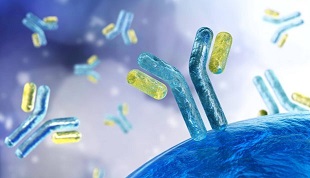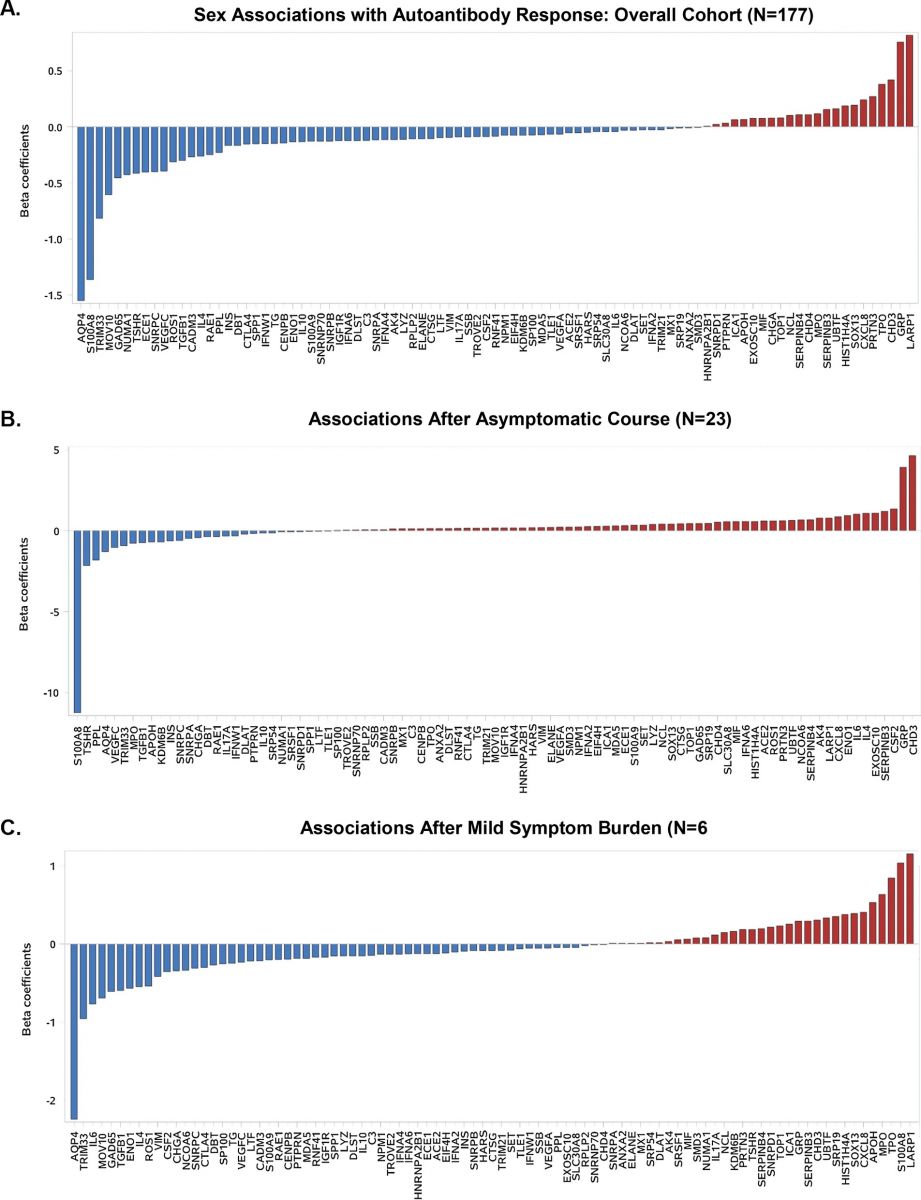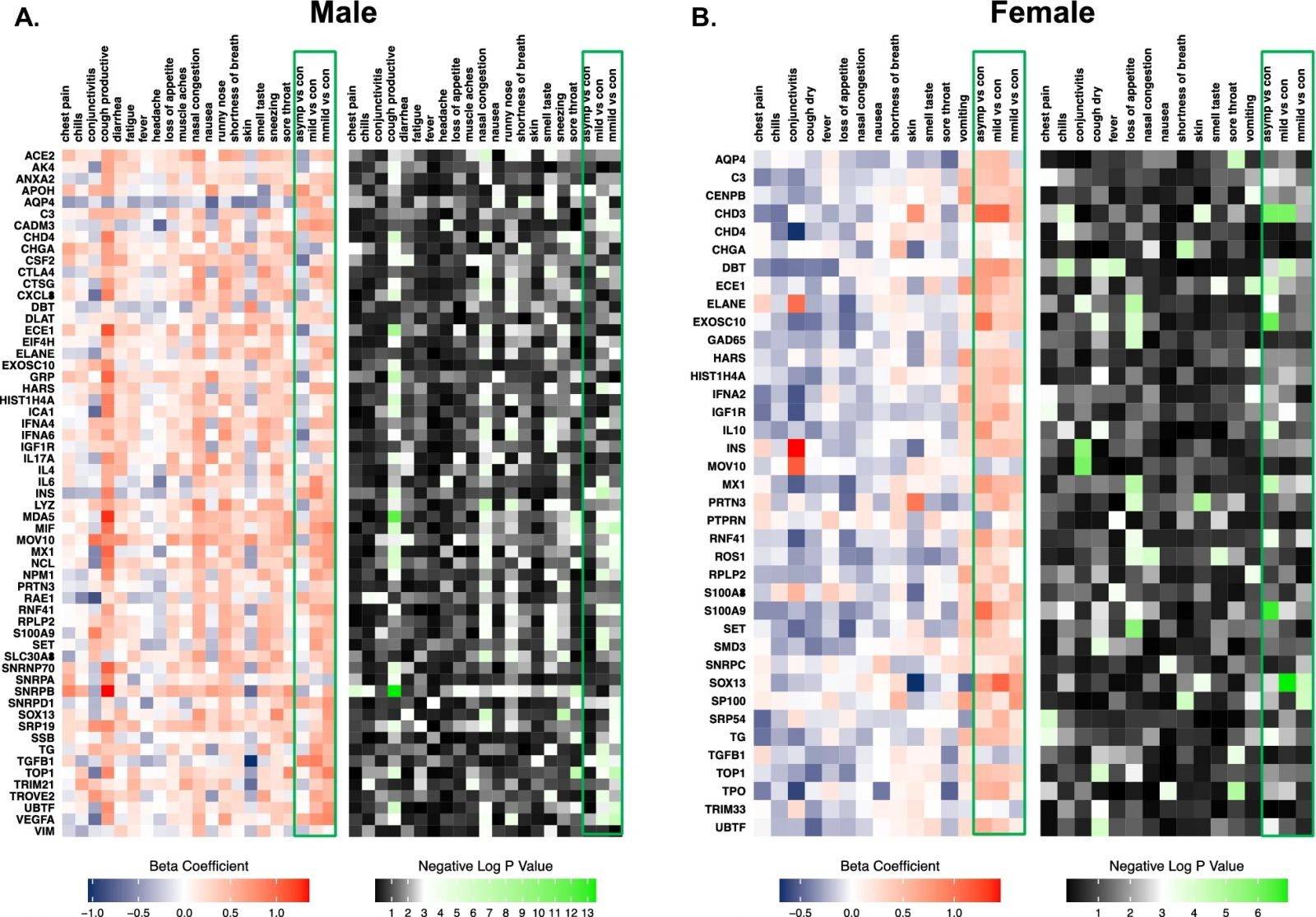Cedars-Sinai Study Confirms SARS-CoV-2 Infections Irrespective Of Even Mild Or Asymptomatic Will Trigger Autoantibodies Leading To Autoimmune Issues!
Source: SARS-CoV-2 Induced Autoantibodies Dec 31, 2021 4 years, 2 months, 19 hours, 53 minutes ago
More good news! A new study led by researchers from Cedars-Sinai Medical Center, California-USA has confirmed all preliminary findings and hypothesis that SARS-CoV-2 infections irrespective of even mild or asymptomatic will trigger autoantibodies leading to variety autoimmune issues in the human host!

The study team initially planned to focus on the sex-specific autoimmune reactivity to SARS-CoV-2 in the absence of extreme clinical disease as pronounced sex differences in the susceptibility and response to SARS-CoV-2 infection remain poorly understood and considering that immune-inflammatory activity can be sex-biased in the setting of severe COVID-19 illness.
For those who wish to survive the coming COVID-19 Surges and Long COVID Issues, kindly support by making a donation to sustain this website and all our research and community initiatives. Your help saves lives directly and indirectly including yours and you may not even know it. Thank You. We are still holding back lots of interesting research about prophylactics and therapeutics and long COVID solutions.
https://www.thailandmedical.news/p/sponsorship
The study team assessed autoantibody (AAB) reactivity to 91 autoantigens previously linked to a range of classic autoimmune diseases in a cohort of 177 participants (65% women, 35% men, mean age of 35) with confirmed evidence of prior SARS-CoV-2 infection based on presence of antibody to the nucleocapsid protein of SARS-CoV-2.
Data were compared to 53 pre-pandemic healthy controls (49% women, 51% men). For each participant, socio-demographic data, serological analyses, SARS-CoV-2 infection status and COVID-19 related symptoms were collected by an electronic survey of questions. The symptoms burden score was constructed based on the total number of reported symptoms (N = 21) experienced within 6 months prior to the blood draw, wherein a greater number of symptoms corresponded to a higher score and assigned as more severe burden.
The
SARS-CoV-2 Induced Autoantibodies study findings showed observed sex-specific patterns of autoreactivity associated with the presence or absence (as well as timing and clustering of symptoms) associated with prior COVID-19 illness. Whereas the overall AAB response was more prominent in women following asymptomatic infection, the breadth and extent of AAB reactivity was more prominent in men following at least mildly symptomatic infection. Notably, the observed reactivity included distinct antigens with molecular homology with SARS-CoV-2.
The study findings concluded that prior SARS-CoV-2 infection, even in the absence of severe clinical disease, can lead to a broad AAB response that exhibits sex-specific patterns of prevalence and antigen selectivity. Further understanding of the nature of triggered AAB activation among men and women exposed to SARS-CoV-2 will be essential for developing effective interventions against immune-mediated sequelae of COVID-19.
The study findings were published in the peer reviewed Journal of Translational Medicine.
t;
https://translational-medicine.biomedcentral.com/articles/10.1186/s12967-021-03184-8
The study findings confirmed that infection with the SARS-CoV-2 coronavirus that causes COVID-19 can trigger an immune response that lasts well beyond the initial infection and recovery even among people who had mild symptoms or no symptoms at all.
Typically, when individuals are infected with a virus or other pathogen, their bodies unleash proteins called antibodies that detect foreign substances and keep them from invading cells.
However, in some cases, individuals also produce autoantibodies that can attack the body's own organs and tissues over time.
The study team found that individuals with prior infection with SARS-CoV-2, the virus that causes COVID-19, have a wide variety of autoantibodies up to six months after they have fully recovered.
Previous to this study, scientists and medical experts knew that severe cases of COVID-19 can stress the immune system so much that autoantibodies are produced.
Alarmingly, this new study is the first to report not only the presence of elevated autoantibodies after mild or asymptomatic infection, but their persistence over time.
Co-senior author Dr Justyna Fert-Bober, Ph.D., a research scientist in the Department of Cardiology at the Smidt Heart Institute at Cedars-Sinai told Thailand
Medical News, "These study findings help to explain what makes COVID-19 an especially unique disease. These patterns of immune dysregulation could be underlying the different types of persistent symptoms we see in people who go on to develop the condition now referred to as long COVID-19."
In order to conduct their study, the study team recruited 177 people with confirmed evidence of a previous infection with SARS-CoV-2. They compared blood samples from these individuals with samples taken from healthy people prior to the pandemic.
Shockingly, all study participants with confirmed SARS-CoV-2 infection had elevated levels of autoantibodies. Some of the autoantibodies also have been found in people with diseases in which the immune system attacks its own healthy cells, such as lupus and rheumatoid arthritis.
 Sex associations with autoantibody activation by symptoms burden, in men and women previously infected by SARS-CoV-2. The age-adjusted associations of sex (female versus male) with AABs activation across the panel of 91 antigens are shown for the primary cohort overall (A) and within persons with varying loads of symptom burden: asymptomatic (B), mild symptom burden (C), more than mild symptom burden (D)
Sex associations with autoantibody activation by symptoms burden, in men and women previously infected by SARS-CoV-2. The age-adjusted associations of sex (female versus male) with AABs activation across the panel of 91 antigens are shown for the primary cohort overall (A) and within persons with varying loads of symptom burden: asymptomatic (B), mild symptom burden (C), more than mild symptom burden (D)
Co-senior author Dr Susan Cheng, MD, MPH, MMSc, director of the Institute for Research on Healthy Aging in the Department of Cardiology at the Smidt Heart Institute-Ceadrs-Sinai further added, “Our study team found signals of autoantibody activity that are usually linked to chronic inflammation and injury involving specific organ systems and tissues such as the joints, skin and nervous system."
Many of the autoantibodies found have been linked to autoimmune diseases that typically affect women more often than men. In this study, however, men had a higher number of elevated autoantibodies than women.
Dr Fert-Bober added, "On the one hand, this finding is paradoxical given that autoimmune conditions are usually more common in females. On the other hand, it is also somewhat expected given all that we know about males being more vulnerable to the most severe forms of COVID-19."
The study team is interested in expanding the study to look for the types of autoantibodies that may be present and persist in people with long-haul COVID-19 symptoms.
As this study was in individuals infected before the advent of vaccines, the study team will also examine whether autoantibodies are similarly generated in people with breakthrough infections.
Dr Cheng added,"If we can better understand these autoantibody responses, and how it is that SARS-CoV-2 infection triggers and drives these variable responses, then we can get one step closer to identifying ways to treat and even prevent these effects from developing in people at risk.”
 Sex-specific associations of autoantibody reactivity with individual symptoms, in persons previously infected by SARS-CoV-2. From age-adjusted regression analyses, beta coefficients and negative log p values were obtained from examining the associations of symptoms with distinct autoantibodies. Associations for men are shown in A. Associations for women are shown in B
Sex-specific associations of autoantibody reactivity with individual symptoms, in persons previously infected by SARS-CoV-2. From age-adjusted regression analyses, beta coefficients and negative log p values were obtained from examining the associations of symptoms with distinct autoantibodies. Associations for men are shown in A. Associations for women are shown in B
The study team did highlight certain study limitations. The study cohort included HCWs from a single center who volunteered and responded to surveys, potentially limiting generalizability. Given this study’s focus on the milder spectrum of COVID-19 disease presentation and its sequelae, gradation of illness severity was determined based on self-reported symptom burden and very few of the cases (1.7%) required hospitalization and none were treated with immune-modulating therapies for their COVID-19 illness. Thus, further studies are needed to evaluate generalizability of the findings to populations that experienced more severe COVID-19 illness requiring targeted treatments.
The study team was also unable to verify exact dates of prior COVID-19 infection due to lack of universal PCR testing available during the initial phases of the pandemic and, thus, associations between timing of infection, symptoms, and AAB response could not be precisely analyzed.
Also, the study had a relatively small number of male subjects (n = 63) that may have limited the ability to detect potential additional predicators of post-COVID autoimmunity; thus, further investigations of larger sized samples are needed.
The study team concluded, “In summary, this comprehensive study of AABs to a wide array of antigens found that male sex carries the risk of diverse autoimmune activation following symptomatic COVID-19 illness, whereas female sex carries risk for a distinct profile of autoimmune activation following asymptomatic SARS-CoV-2 exposure. Importantly, both sets of sex-specific AAB reactivity patterns were found to persist up to 6 months following associated symptomatology. Further understanding of the nature of triggered and persistent AAB activation among individuals who are exposed to SARS-CoV-2 and vulnerable to its potentially morbid clinical sequelae will be essential for developing effective interventions and therapeutics.”
Thailand
Medical News would like to add that with the latest findings about viral persistence, studies showing about the increased risk of cardiovascular deaths in Post-COVID-19 and increased cancer risk in Post-COVID-19 and now these study findings, people should start waking up and realizing that once you are infected with the SARS-CoV-2 coronavirus irrespective of whatever strain or variant including what many are calling the mild variant ie Omicron and irrespective of whether you were asymptomatic or only had mild symptoms, you are basically ‘screwed’! (Pardon the language). Sooner or later your health status is compromised and you will ultimately succumb to the after effects and arising health and medical conditions associated with Post-COVID!
https://www.thailandmedical.news/news/breaking-u-s-nih-study-shockingly-reveals-sars-cov-2-viral-persistence-throughout-human-body-and-in-the-brain-even-in-those-who-were-asymptomatic
https://www.thailandmedical.news/news/finally-an-american-study-that-confirms-what-we-have-been-saying-all-this-time-covid-19-is-contributing-to-excess-deaths-from-heart-issues
https://www.thailandmedical.news/news/breaking-new-international-study-warns-that-sars-cov-2-infections-will-lead-to-cancers-especially-colorectal-cancers-due-to-disruption-in-autophagy
https://www.thailandmedical.news/news/why-is-no-one-warning-the-masses-that-the-sars-cov-2-spike-proteins-are-causing-major-immunodeficiency-issues-in-all-infected-individuals
https://www.thailandmedical.news/news/good-news-preliminary-unpublished-data-shows-that-omicron-might-not-affect-lungs-much,-rather-your-brains,-heart-and-other-organs-are-targets
Have a great New Year 2022. The next year and following years will be fun times for all!
For those who wish to survive the coming COVID-19 Surges and Long COVID Issues, kindly support by making a donation to sustain this website and all our research and community initiatives. Your help saves lives directly and indirectly including yours and you may not even know it. Thank You. We are still holding back lots of interesting research about prophylactics and therapeutics and long COVID solutions.
https://www.thailandmedical.news/p/sponsorship
For more about
SARS-CoV-2 Induced Autoantibodies, keep on logging to Thailand Medical News.


 Sex-specific associations of autoantibody reactivity with individual symptoms, in persons previously infected by SARS-CoV-2. From age-adjusted regression analyses, beta coefficients and negative log p values were obtained from examining the associations of symptoms with distinct autoantibodies. Associations for men are shown in A. Associations for women are shown in B
Sex-specific associations of autoantibody reactivity with individual symptoms, in persons previously infected by SARS-CoV-2. From age-adjusted regression analyses, beta coefficients and negative log p values were obtained from examining the associations of symptoms with distinct autoantibodies. Associations for men are shown in A. Associations for women are shown in B